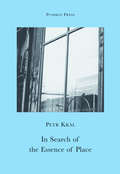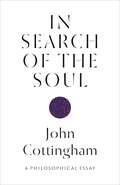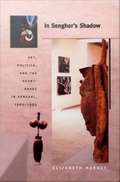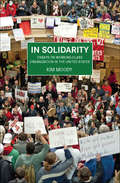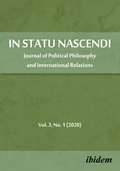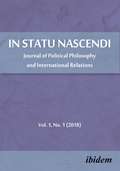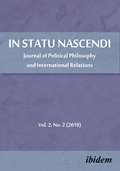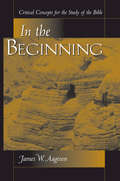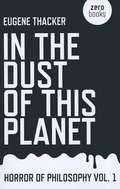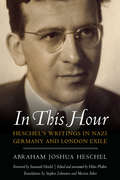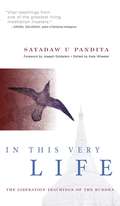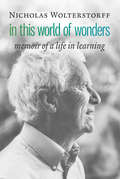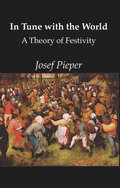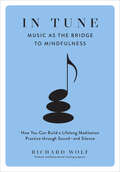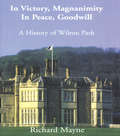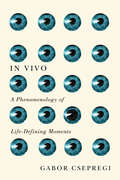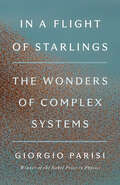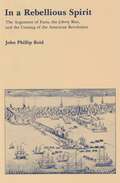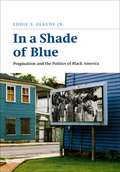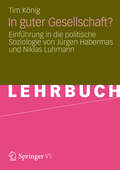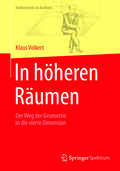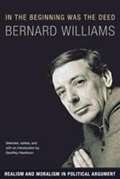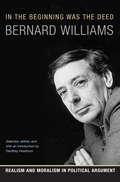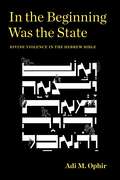- Table View
- List View
In Search of the Essence of Place
by Christopher Moncrieff Petr KralArmed only with his poetic sensibility, Petr Král sets out to explore our relationship with the places that we inhabit, and with the apparently unremarkable everyday objects which often inform and enrich our lives.Král bears witness to Flaubert's observation that "in order for something to become interesting, we simply have to look at it for a long time". He reveals, not only the inner life-the very essence-of mundane objects and places, but also simple yet profound truths about ourselves.
In Search of the Soul: A Philosophical Essay
by John CottinghamHow our beliefs about the soul have developed through the ages, and why an understanding of it still matters todayThe concept of the soul has been a recurring area of exploration since ancient times. What do we mean when we talk about finding our soul, how do we know we have one, and does it hold any relevance in today’s scientifically and technologically dominated society? From Socrates and Augustine to Darwin and Freud, In Search of the Soul takes readers on a concise, accessible journey into the origins of the soul in Western philosophy and culture, and examines how the idea has developed throughout history to the present. Touching on literature, music, art, and theology, John Cottingham illustrates how, far from being redundant in contemporary times, the soul attunes us to the importance of meaning and value, and experience and growth. A better understanding of the soul might help all of us better understand what it is to be human.Cottingham delves into the evolution of our thoughts about the soul through landmark works—including those of Aristotle, Plato, and Descartes. He considers the nature of consciousness and subjective experience, and discusses the psychoanalytic view that large parts of the human psyche are hidden from direct conscious awareness. He also reflects on the mysterious and universal longing for transcendence that is an indelible part of our human makeup. Looking at the soul’s many dimensions—historical, moral, psychological, and spiritual—Cottingham makes a case for how it exerts a powerful pull on all of us.In Search of the Soul is a testimony to how the soul remains a profoundly significant aspect of human flourishing.
In Senghor's Shadow: Art, Politics, and the Avant-Garde in Senegal, 1960-1995
by Elizabeth HarneyIn Senghor's Shadow is a unique study of modern art in postindependence Senegal. Elizabeth Harney examines the art that flourished during the administration of Lopold Sdar Senghor, Senegal's first president, and in the decades since he stepped down in 1980. As a major philosopher and poet of Negritude, Senghor envisioned an active and revolutionary role for modern artists, and he created a well-funded system for nurturing their work. In questioning the canon of art produced under his aegis--known as the Ecole de Dakar--Harney reconsiders Senghor's Negritude philosophy, his desire to express Senegal's postcolonial national identity through art, and the system of art schools and exhibits he developed. She expands scholarship on global modernisms by highlighting the distinctive cultural history that shaped Senegalese modernism and the complex and often contradictory choices made by its early artists. Heavily illustrated with nearly one hundred images, including some in color, In Senghor's Shadow surveys the work of a range of Senegalese artists, including painters, muralists, sculptors, and performance-based groups--from those who worked at the height of Senghor's patronage system to those who graduated from art school in the early 1990s. Harney reveals how, in the 1970s, avant-gardists contested Negritude beliefs by breaking out of established artistic forms. During the 1980s and 1990s, artists such as Moustapha Dim, Germaine Anta Gaye, and Kan-Si engaged with avant-garde methods and local artistic forms to challenge both Senghor's legacy and the broader art world's understandings of cultural syncretism. Ultimately, Harney's work illuminates the production and reception of modern Senegalese art within the global arena.
In Solidarity: Essays on Working-Class Organization in the United States
by Kim Moody“One of the leading intellectuals of the labor movement” explores the state of unions in the United States, as well as evaluating the forces working against them (Robin D. G. Kelley, author of Hammer and Hoe).In this thorough collection of inspiring and informed essays, Kim Moody, one of the world’s most authoritative and recognized labor writers, asks key questions: What has happened to union organizing in the United States? Is there an alternative to the strike? How does the increased presence of immigrant and women workers change the balance of forces? What strategies can workers use to counteract company “union avoidance” campaigns and bureaucratic “business unionism”? What is the role of socialists in the labor movement?Drawing on his own background as a working-class radical, the works of Karl Marx, and the everyday experiences of nurses, miners, autoworkers, and more, Moody sketches a comprehensive picture of the state of US labor—and points the way forward for a rank-and-file union movement that can win real change.Praise for Kim Moody“One most of the most experienced working-class organizers in the US over the past few decades.” —Monthly Review“[His] books and articles have for more than forty years provided essential analysis and strategy for the labor left.” —New Politics
In Statu Nascendi Volume 3, No. 1: Journal of Political Philosophy and International Relations (In Statu Nascendi Ser.)
by Piotr PietrzakIn Statu Nascendi is a peer-reviewed journal that aspires to be a world-class scholarly platform encompassing original academic research dedicated to the circle of Political Philosophy, Cultural Studies, Theory of International Relations, Foreign Policy, and the political Decision-making process. The journal investigates specific issues through a socio-cultural, philosophical, and anthropological approach to raise a new type of civic awareness about the complexity of contemporary crisis, instability, and warfare situations, where the “stage-of-becoming” plays a vital role.Issue 2020:1 comprises, amongst others, the following interviews & articles: Zoran Kojcic & Piotr Pietrzak: Interview with Dr. Zoran Kojcic on his unique form of philosophical counsellingDimitris M. Moschos: Paul Tillich's Critical and Political Theology and his Critique of ModernityVenera Russo: The Phenomenology of Women. On Female Discourse in Julia Kristeva's and Simone de Beauvoir's workVenera Russo: Cross-language Relation. The Implications of Relativity in Translation and vice versaAnastasia Pranindita & Anak Agung Banyu Perwita: The Republic of Korea – United States of America’s “Strategic Patience”: A counter measurement of the Alliance in Responding to Democratic People’s Republic of Korea’ Nuclear Development Program (2013 – 2017) Eliza Campbell: Dueling with Disinformation: Disinformation and Information and Communication Technologies in the Middle EastPiotr Pietrzak: How would Realists Interpret People Republic of China's wish to “cultivate the image of a responsible great power”?
In Statu Nascendi: Journal of Political Philosophy and International Relations 2019/1 (In Statu Nascendi Ser.)
by Ibd1In Statu Nascendi is a new peer-reviewed journal that investigates specific issues through a socio-cultural, philosophical, and anthropological approach to raise a new type of civic awareness about the complexity of the contemporary crisis, instability, and warfare situations, where the “stage of becoming” plays a vital role.Issue 2019:1 comprises, among others, the following articles:- An Interview with Marcin Grabowski on the Political Situation in Asia in General and North Korea in Particular- The EU and the Migration Crisis: ‘The EU-Turkey Deal’: Policy Effectiveness and Challenges of Implementation- The Syrian Conflict (2011–2017): How a Perfectly Winnable Uprising has been Transformed into a Civil War, Only to End up as a Ferocious Proxy War- Interview with Prof. Maria Dimitrova on Continental Philosophy in General and Emmanuel Levinas’ Philosophy in Particular- Patristic Tradition, Criterialism, and Levinasian Quasi-Theological Conditions of the Self- Reconsidering the Notion of the Creative Genius in Postmodern Philosophy and Art
In Statu Nascendi: Journal of Political Philosophy and International Relations Vol. 1, No. 1 (2018) (In Statu Nascendi Ser.)
by Piotr PietrzakIn Statu Nascendi is a new peer-reviewed journal that aspires to be a world-class scholarly platform encompassing original academic research dedicated to the circle of political philosophy, cultural studies, theory of international relations, foreign policy, and the political decision-making process. The journal investigates specific issues through a sociocultural, philosophical, and anthropological approach to raise a new type of civic awareness about the complexity of contemporary crisis, instability, and warfare situations, where the “stage-of-becoming” plays a vital role.Issue 2018:1 comprises, among others, the following articles:- Corporate Instrumentalization of Deliberative Democracy in Global Governance-Being Transgender and Transgender Being-A Comparative Study Between Levinas and Kierkegaard on Subjectivity and the Self-The Kremlin’s Reaction to the St. Petersburg Metro Attacks Seen Through the Prism of Russian Intervention in Syria- Donald Trump's Visit to Saudi Arabia, Saudi-Iranian Relations, and the Future of the Iranian Nuclear Deal- The United Kingdom on the Verge of a “Constitutional Crisis”: Between the Possibility of a Second Referendum on the Membership in the European Union and a Potential Second Vote on Scottish Independence
In Statu Nascendi: Journal of Political Philosophy and International Relations, Volume 2, No. 2 (2019) (In Statu Nascendi Ser.)
by Piotr PietrzakIn Statu Nascendi is a new peer-reviewed journal that aspires to be a world-class scholarly platform encompassing original academic research dedicated to the circle of Political Philosophy, Cultural Studies, Theory of International Relations, Foreign Policy, and the political Decision-making process. The journal investigates specific issues through a socio-cultural, philosophical, and anthropological approach to raise a new type of civic awareness about the complexity of contemporary crisis, instability, and warfare situations, where the “stage-of-becoming” plays a vital role. Issue 2019:2 comprises, among others, the following interviews & articles:Charity Begins at Home: Resolving the Tensions of Liberalism(s), “White Privilege”, and African Corruption via Rawls and Transnational Digital-CommunitarianismLukács, Kojève, and Verene’s interpretations of Hegel’s recollection in his “Phenomenology of Spirit” Interview with Sami Mehmeti on the political situation in the newly established Republic of Northern Macedonia Madonnas and Whores or Blood and Gore? Roles for Women in the So-Called Islamic StateDonald J. Trump’s Policy Toward North Korea and the Islamic Republic of Iran – a Comparative StudyContrariwise and Inconsistent Positions on Turkey's EU Membership – Do Party Politics Matter in German Foreign Policy?
In The Beginning: Critical Concepts For The Study Of The Bible
by James AagesonA short introduction to the Bible, this text provides readers with insights into reading and studying the Bible.
In The Dust of This Planet (Horror of Philosophy, volume #1)
by Eugene ThackerThe world is increasingly unthinkable, a world of planetary disasters, emerging pandemics, and the looming threat of extinction. In this book Eugene Thacker suggests that we look to the genre of horror as offering a way of thinking about the unthinkable world. To confront this idea is to confront the limit of our ability to understand the world in which we live - a central motif of the horror genre. In the Dust of This Planet explores these relationships between philosophy and horror. In Thacker's hands, philosophy is not academic logic-chopping; instead, it is the thought of the limit of all thought, especially as it dovetails into occultism, demonology, and mysticism. Likewise, Thacker takes horror to mean something beyond the focus on gore and scare tactics, but as the under-appreciated genre of supernatural horror in fiction, film, comics, and music.
In This Hour: Heschel's Writings in Nazi Germany and London Exile
by Abraham Joshua HeschelIn This Hour offers the first English translations of selected German writings by Abraham Joshua Heschel from his tumultuous years in Nazi-ruled Germany and months in London exile, before he found refuge in the United States. Moreover, several of the works have never been published in any language. Composed during a time of intense crisis for European Jewry, these writings both argue for and exemplify a powerful vision of spiritually rich Jewish learning and its redemptive role in the past and the future of the Jewish people. The collection opens with the text of a speech in which Heschel laid out with passion his vision for Jewish education. Then it goes on to present his teachings: a set of essays about the rabbis of the Mishnaic period, whose struggles paralleled those of his own time; the biography of the medieval Jewish scholar and leader Don Yitzhak Abravanel; reflections on the power and meaning of repentance, written for the High Holidays in 1936; and a short story on Jewish exile, written for Hanukkah 1937. The collection closes with a set of four recently discovered meditations—on suffering, prayer, spirituality, and God—in which Heschel grapples with the horrors unfolding around him. Taken together, these essays and story fill a significant void in Heschel’s bibliography: his Nazi Germany and London exile years. These translations convey the spare elegance of Heschel’s prose, and the introduction and detailed notes make the volume accessible to readers of all knowledge levels. As Heschel teaches history, his voice is more than that of a historian: the old becomes new, and the struggles of one era shed light on another. Even as Heschel quotes ancient sources, his words address the issues of his own time and speak urgently to ours.
In This Very Life
by Kate Wheeler Joseph Goldstein Sayadaw U Pandita Venerable U AggacittaBurmese meditation master Sayadaw U Pandita shows us that freedom is as immediate as breathing, as fundamental as a footstep. In this book he describes the path of the Buddha and calls all of us to that heroic journey of liberation. Enlivened by numerous case histories and anecdotes, In This Very Life is a matchless guide to the inner territory of meditation - as described by the Buddha.
In This World of Wonders: Memoir of a Life in Learning
by Nicholas WolterstorffWorld-renowned Christian philosopher. Beloved professor. Author of the classic Lament for a Son. Nicholas Wolterstorff is all of these and more. His memoir, In This World of Wonders, opens a remarkable new window into the life and thought of this remarkable man.Written not as a complete life story but as a series of vignettes, Wolterstorff’s memoir moves from his humble beginnings in a tiny Minnesota village to his education at Calvin College and Harvard University, to his career of teaching philosophy and writing books, to the experiences that prompted some of his writing—particularly his witnessing South African apartheid and Palestinian oppression firsthand.In This World of Wonders is the story of a thoughtful and grateful Christian whose life has been shaped by many loves—love of philosophy, love of family, love of art and architecture, love of nature and gardening, and more. It’s a lovely, wonderful story.
In Tune with the World: A Theory of Festivity
by Pieper Josef Richard Winston Claran this stimulating and still-timely study, Josef Pieper takes up a theme of paramount importance to his thinking – that festivals belong by rights among the great topics of philosophical discussion. As he develops his theory of festivity, the modern age comes under close and painful scrutiny. It is obvious that we no longer know what festivity is, namely, the celebration of existence under various symbols <P><P> Pieper exposes the pseudo-festivals, in their harmless and their sinister forms: traditional feasts contaminated by commercialism; artificial holidays created in the interest of merchandisers; holidays by coercion, decreed by dictators the world over; festivals as military demonstrations; holidays empty of significance. And lastly we are given the apocalyptic vision of a nihilistic world which would seek its release not in festivities but in destruction.
In Tune: Music as the Bridge to Mindfulness
by Richard WolfIn our noisy world, music is the key to inner silence Richard Wolf first tried Zen meditation in his teens, but no matter in what posture or for how long he sat, transcendence proved stubbornly out of reach. It was only years later that he found the bridge that could take him there: music.In Tune charts twelve “bridges”—skills and sensibilities refined in musical practice that carry over to mindfulness and meditation, among them: ·Concentration ·Posture ·Harmony ·Silence ·The Art of Deep Listening ·Transcending the SelfThis inspirational guide offers a wealth of music-based exercises to enhance daily meditation and creativity. Plus, Wolf shares personal anecdotes of eminent musicians—from Miles Davis to Dr. Dre—to illuminate points along the intersection of music and mindful living. As you begin to move fluidly between these two transformative disciplines, you’ll notice the focus, composure, and peacefulness that comes from practice—as well as the joys of tuning in to the music all around you, and to the symphony that plays silently from within.
In Victory, Magnanimity, in Peace, Goodwill: A History of Wilton Park (Whitehall Histories Ser.)
by Richard MayneWilton Park was once a secret camp for interrogating enemy generals during World War II. But it took on its true, unique role in 1946 as a training centre for German prisoners-of-war. This volume tells of its history and the extraordinary life of Heinz Koeppler, its founding father.
In Vivo: A Phenomenology of Life-Defining Moments
by Gabor CsepregiOver the century between the first Oblate mission to the Canadian central Arctic in 1867 and the radical shifts brought about by Vatican II, the region was the site of complex interactions between Inuit, Oblate missionaries, and Grey Nuns – interactions that have not yet received the attention they deserve. Enriching archival sources with oral testimony, Frédéric Laugrand and Jarich Oosten provide an in-depth analysis of conversion, medical care, education, and vocation in the Keewatin region of the Northwest Territories. They show that while Christianity was adopted by the Inuit and major transformations occurred, the Oblates and the Grey Nuns did not eradicate the old traditions or assimilate the Inuit, who were caught up in a process they could not yet fully understand. The study begins with the first contact Inuit had with Christianity in the Keewatin region and ends in the mid-1960s, when an Inuk woman joined the Grey Nuns and two Inuit brothers became Oblate missionaries. Bringing together many different voices, perspectives, and experiences, and emphasizing the value of multivocality in understanding this complex period of Inuit history, Inuit, Oblate Missionaries, and Grey Nuns in the Keewatin, 1865–1965 highlights the subtle nuances of a long and complex interaction, showing how salvation and suffering were intertwined.
In a Flight of Starlings: The Wonders of Complex Systems
by Giorgio ParisiFrom the 2021 Nobel Prize winner in Physics, an enlightening and personal journey into the practice of groundbreaking science &“[Giorgio Parisi is] an extraordinary scientist.&” —Carlo RovelliWith In a Flight of Starlings, celebrated physicist Giorgio Parisi guides us through his unorthodox yet exhilarating work, starting with investigating the principles of physics by observing the flight of flocks of birds. Studying the movements of these communities, he has realized, proves an illuminating way into understanding complex systems of all kinds—collections of everything from atoms and planets to other animals, such as ourselves.Along the way, he reflects on the lessons he has taken from a life in pursuit of scientific truth: the importance of serendipity to the discovery of new ideas, the surprising kinship between physics and other disciplines, and the value of science to a thriving society. In so doing, he removes the practice of science from the confines of the laboratory and brings it into the real world.Part elegant scientific treatise, part thrilling journey of discovery, In a Flight of Starlings is an invitation to find wonder in the world around us.
In a Rebellious Spirit: The Argument of Facts, the Liberty Riot, and the Coming of the American Revolution
by John P. ReidA fresh view of the legal arguments leading to the American Revolution, this book argues that rebellious acts called "lawless" mob action by British authorities were sanctioned by "whig law" in the eyes of the colonists. Professor Reid also holds that leading historians have been misled by taking both sides' forensic statements at face value.The focus is on three events. First was the Malcom Affair (1766), when a Boston merchant and his friends faced down a sheriff's party seeking smuggled goods, arguing that the search warrant was invalid. Second was a parade in Boston to celebrate the second anniversary (1768) of the repeal of the Stamp Act—an occasion when some revenue officials were hanged in effigy. Third was the Liberty "riot" (1768), when customs officers boarded John Hancock's ship and were carried off by a crowd including the aforementioned Malcom.Legal inquires into the three events were marked by hyperbole on both sides. Whigs depicted Crown officials as lawless trespassers serving a foreign tyrant. Tories painted the Sons of Liberty as lawless mobs of almost savage ferocity. Both sides, as the author shows, had extralegal motives: whigs to enlist supporters in the other colonies for the cause of independence; tories to bring British troops and warships to Massachusetts in support of the status quo. Both succeeded in their polemical aims, and both have gulled most historians.
In a Shade of Blue: Pragmatism and the Politics of Black America
by Eddie S. Glaude Jr.&“An audacious attempt to wrestle with the significant theoretical and political challenges of race, religion, and reason in our contemporary moment.&”—Corey D. B. Walker, Journal of the American Academy of Religion In this provocative book, Eddie S. Glaude Jr., one of our nation&’s rising young African American intellectuals, makes an impassioned plea for black America to address its social problems by recourse to experience and with an eye set on the promise and potential of the future, rather than the fixed ideas and categories of the past. Central to Glaude&’s mission is a rehabilitation of philosopher John Dewey, whose ideas, he argues, can be fruitfully applied to a renewal of African American politics. According to Glaude, Dewey&’s pragmatism, when attentive to the darker dimensions of life—or what we often speak of as the blues—can address many of the conceptual problems that plague contemporary African American discourse. How blacks think about themselves, how they imagine their own history, and how they conceive of their own actions can be rendered in ways that escape bad ways of thinking that assume a tendentious political unity among African Americans simply because they are black. Drawing deeply on black religious thought and literature, In a Shade of Blue seeks to dislodge such crude and simplistic thinking and replace it with a deeper understanding of and appreciation for black life in all its variety and intricacy. In a Shade of Blue is a remarkable work of political commentary and to follow its trajectory is to learn how African Americans arrived at this critical moment in their cultural and political history and to envision where they might head in the twenty-first century.
In guter Gesellschaft?
by Tim KönigJürgen Habermas und Niklas Luhmann haben über mehrere Jahrzehnte hinweg sowohl die allgemeine sozialwissenschaftliche Theoriebildung als auch die Diskussionen zur politischen Theorie entscheidend geprägt. Das vorliegende Buch führt in die Theorien des Sozialen und der Politik beider Autoren ein und zeigt auf, inwiefern beide miteinander zusammenhängen. Diskurs- und Systemtheorie der Politik können damit in ihren jeweiligen Leistungen und Grenzen besser nachvollzogen werden.
In höheren Räumen: Der Weg der Geometrie in die vierte Dimension (Mathematik im Kontext)
by Klaus VolkertDas vorliegende Buch schildert, wie sich die Geometrie in der zweiten Hälfte des 19. Jhs. allmählich von der Beschränkung der bis dato als selbstverständlich angenommenen Einzigartigkeit und Dreidimensionalität des Raumes befreite, was die Motive hierfür waren und welche Ergebnisse erzielt wurden. Unter diesen ragt ein Topos heraus: die Bestimmung der regulären Polytope im vierdimensionalen Raum. Nicht nur innermathematisch erregte die neue Geometrie Aufsehen; der Versuch, sie zur „wissenschaftlichen“ Erklärung spiritistischer Kunststücke heranzuziehen, führte bald dazu, dass die vierte Dimension in aller Munde war. Selten hat ein mathematisches Konzept eine solche Popularität erreicht wie die vierte Dimension; ein interessantes, heute fast vergessenes Kapitel zum Thema Mathematik und Öffentlichkeit wurde aufgeblättert. Dieses Buch schildert ausführlich den „Zöllner-Skandal“, ausgelöst durch die erwähnten Erklärungsversuche des Leipziger Astrophysiker Friedrich Karl Zöllner, und die Reaktionen hierauf seitens der Mathematiker, deren Strategie sich schlagwortartig als "Zurück in den Elfenbeinturm" charakterisieren lässt. Schließlich kommen die Beziehungen der vierten Dimension zu anderen Kulturgebieten wie bildende Kunst und Literatur zur Sprache. Philosophische Aspekte sind allgegenwärtig in der Geschichte der vierten Dimension.Das Buch wendet sich an alle, die sich für die Geschichte der Mathematik und deren Einbettung in eine allgemeinere Kulturgeschichte interessieren. Es setzt wenig mehr als Schulgeometrie voraus.
In the Beginning Was the Deed: Realism and Moralism in Political Argument
by Bernard WilliamsBernard Williams is remembered as one of the most brilliant and original philosophers of the past fifty years. Widely respected as a moral philosopher, Williams began to write about politics in a sustained way in the early 1980s. There followed a stream of articles, lectures, and other major contributions to issues of public concern--all complemented by his many works on ethics, which have important implications for political theory. This new collection of essays, most of them previously unpublished, addresses many of the core subjects of political philosophy: justice, liberty, and equality; the nature and meaning of liberalism; toleration; power and the fear of power; democracy; and the nature of political philosophy itself. A central theme throughout is that political philosophers need to engage more directly with the realities of political life, not simply with the theories of other philosophers. Williams makes this argument in part through a searching examination of where political thinking should originate, to whom it might be addressed, and what it should deliver. Williams had intended to weave these essays into a connected narrative on political philosophy with reflections on his own experience of postwar politics. Sadly he did not live to complete it, but this book brings together many of its components. Geoffrey Hawthorn has arranged the material to resemble as closely as possible Williams's original design and vision. He has provided both an introduction to Williams's political philosophy and a bibliography of his formal and informal writings on politics. Those who know the work of Bernard Williams will find here the familiar hallmarks of his writing--originality, clarity, erudition, and wit. Those who are unfamiliar with, or unconvinced by, a philosophical approach to politics, will find this an engaging introduction. Both will encounter a thoroughly original voice in modern political theory and a searching approach to the shape and direction of liberal political thought in the past thirty-five years.
In the Beginning Was the Deed: Realism and Moralism in Political Argument
by Bernard WilliamsBernard Williams is remembered as one of the most brilliant and original philosophers of the past fifty years. Widely respected as a moral philosopher, Williams began to write about politics in a sustained way in the early 1980s. There followed a stream of articles, lectures, and other major contributions to issues of public concern--all complemented by his many works on ethics, which have important implications for political theory. This new collection of essays, most of them previously unpublished, addresses many of the core subjects of political philosophy: justice, liberty, and equality; the nature and meaning of liberalism; toleration; power and the fear of power; democracy; and the nature of political philosophy itself. A central theme throughout is that political philosophers need to engage more directly with the realities of political life, not simply with the theories of other philosophers. Williams makes this argument in part through a searching examination of where political thinking should originate, to whom it might be addressed, and what it should deliver. Williams had intended to weave these essays into a connected narrative on political philosophy with reflections on his own experience of postwar politics. Sadly he did not live to complete it, but this book brings together many of its components. Geoffrey Hawthorn has arranged the material to resemble as closely as possible Williams's original design and vision. He has provided both an introduction to Williams's political philosophy and a bibliography of his formal and informal writings on politics. Those who know the work of Bernard Williams will find here the familiar hallmarks of his writing--originality, clarity, erudition, and wit. Those who are unfamiliar with, or unconvinced by, a philosophical approach to politics, will find this an engaging introduction. Both will encounter a thoroughly original voice in modern political theory and a searching approach to the shape and direction of liberal political thought in the past thirty-five years.
In the Beginning Was the State: Divine Violence in the Hebrew Bible (Idiom: Inventing Writing Theory)
by Adi M. OphirThis book explores God’s use of violence as depicted in the Hebrew Bible. Focusing on the Pentateuch, it reads biblical narratives and codes of law as documenting formations of theopolitical imagination. Ophir deciphers the logic of divine rule that these documents betray, with a special attention to the place of violence within it. The book draws from contemporary biblical scholarship, while also engaging critically with contemporary political theory and political theology, including the work of Walter Benjamin, Giorgio Agamben, Jan Assmann, Regina Schwartz, and Michael Walzer.Ophir focuses on three distinct theocratic formations: the rule of disaster, where catastrophes are used as means of governance; the biopolitical rule of the holy, where divine violence is spatially demarcated and personally targeted; and the rule of law where divine violence is vividly remembered and its return is projected, anticipated, and yet postponed, creating a prolonged lull for the text’s present.Different as these formations are, Ophir shows how they share an urform that anticipates the main outlines of the modern European state, which has monopolized the entire globe. A critique of the modern state, the book argues, must begin in revisiting the deification of the state, unpacking its mostly repressed theological dimension.
